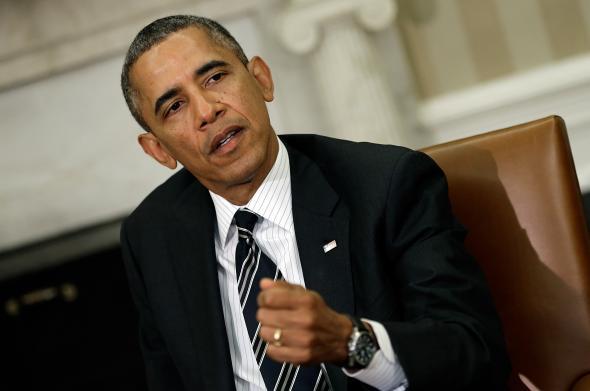Since winning the Nobel Peace Prize in 2009, President Obama has, by my count, ordered new or expanded military operations—including airstrikes, special operations raids, and troop “surges”—in seven countries: Afghanistan, Pakistan, Yemen, Libya, Somalia, Iraq, and now Syria. (And that’s not counting a number of smaller U.S. military engagements in Africa aimed at targets including Boko Haram and the Lord’s Resistance Army.) That’s a lot by the standards of the modern presidency.
You can argue that Obama’s foreign policy is reactive, unfocused, or hypocritical, but it’s time to acknowledge that one thing he’s not, despite the criticism often leveled at him, is some sort of pacifist who’s reluctant to use military force and deferential to the views of the international community.
With that out of the way, there are some big unanswered questions about what this operation can accomplish even in the best-case scenario. Monday night’s airstrikes reportedly killed about 70 ISIS fighters as well as eight civilians, including three children, according to Syrian opposition groups. Unlike the strikes in recent weeks in Iraq, which targeted individual ISIS assets, these were aimed at the group’s headquarters in Raqqa.
The Iraq strikes so far seem to have failed to have a serious impact on ISIS’ momentum. But it seems possible now that those strikes were meant to merely slow the group’s momentum while intelligence was gathered for the more important actions within Syria. There are also some reports that the U.S. attacked the al-Qaida-linked group Jabhat al-Nusra—an enemy of ISIS that is believed by some in the intelligence community to pose a greater threat to the U.S. and Western countries.
It’s a bizarre twist to the tragic recent history of Syria that after three years of debate as to whether the U.S. should use military force against the government of Bashar al-Assad, the U.S. is finally intervening against Assad’s enemies.
The U.S. will insist that it’s in no way coordinating its actions with the Syrian government. That country’s foreign ministry, though, is claiming that its U.N. ambassador was informed in advance of the strikes. And according to the New York Times, “administration officials acknowledge that American efforts to roll back the Sunni militant group in Syria cannot help but aid Mr. Assad.”
Western-supported rebel groups have welcomed the airstrikes, and the current argument is that if Western countries can soften up ISIS, it will give the rebels the space they need to take on ISIS themselves. That’s an awfully optimistic view.
The regional Sunni governments supporting the strikes, including Bahrain, Jordan, Qatar, Saudi Arabia, and the United Arab Emirates, are now discussing plans to train a “Sunni peshmerga” as a long-term strategy to fight ISIS and al-Nusra in Syria as well as the Assad government. To take a more pessimistic (and perhaps realistic) view of things, it’s just as likely the strikes will weaken ISIS, allowing the Syrian regime to focus on its goal of crushing other rebel groups, meaning that American fighter planes would effectively be acting as Assad’s air force.
Even assuming the airstrikes can accomplish their goal of permanently disabling ISIS, which historical precedent suggests is far from certain, the two most likely scenarios are not all that promising. The first is that Assad’s regime maintains its grip on power, becoming a dispiriting case study in the long-term political effectiveness of wanton brutality and the slaughter of a nation’s own population. The second is that there will be a prolonged civil war in Syria that continues to fester and draw in more international actors for years to come.
It’s tempting to wonder now if this could have all been avoided if the U.S. and other governments had more forcefully aided the rebels in the early days of the Syrian uprising. Perhaps if Assad, like Muammar al-Qaddafi, had been overthrown with Western help in 2011 or 2012, ISIS would never have emerged as the force it has become. The long delay certainly weakened and divided the Syrian rebels the U.S. is now counting on. On the other hand, the current state of affairs in Libya isn’t exactly hunky-dory.
The reality is that there was never a good option in the series of events leading up to America’s newest military intervention. And the administration’s argument that this is the best strategy available at the moment to confront a pressing global security threat is a reasonable one.
But all the same, this is yet another open-ended military engagement by the U.S., and another complex Middle Eastern conflict it has little hope of resolving or even improving. Its legitimacy under international law is also questionable, and these strikes have a very good chance of eventually benefiting America’s enemies.
President Obama may believe that this is the best option available. But one wonders what the candidate who famously claimed he was not against all wars, just “dumb” wars, would make of the United States’ latest military foray.
